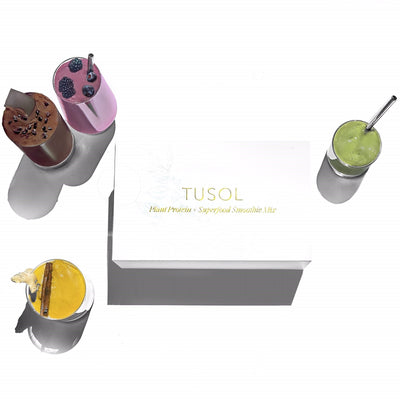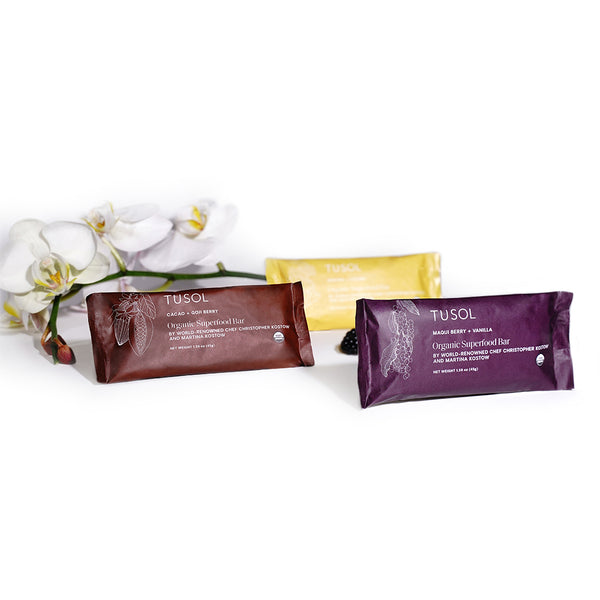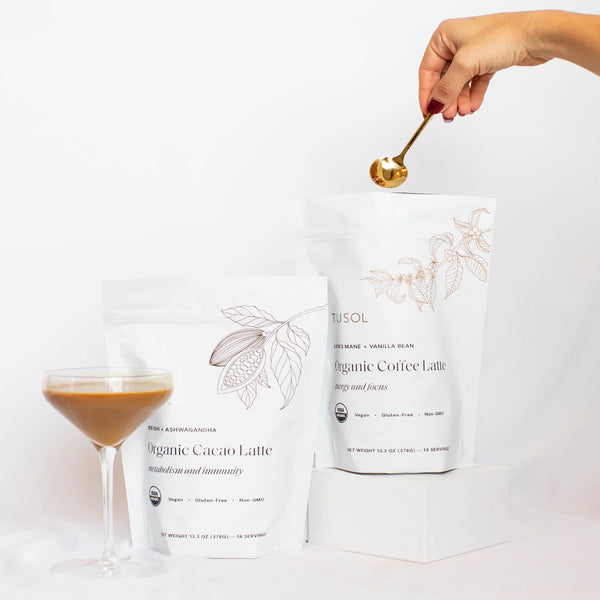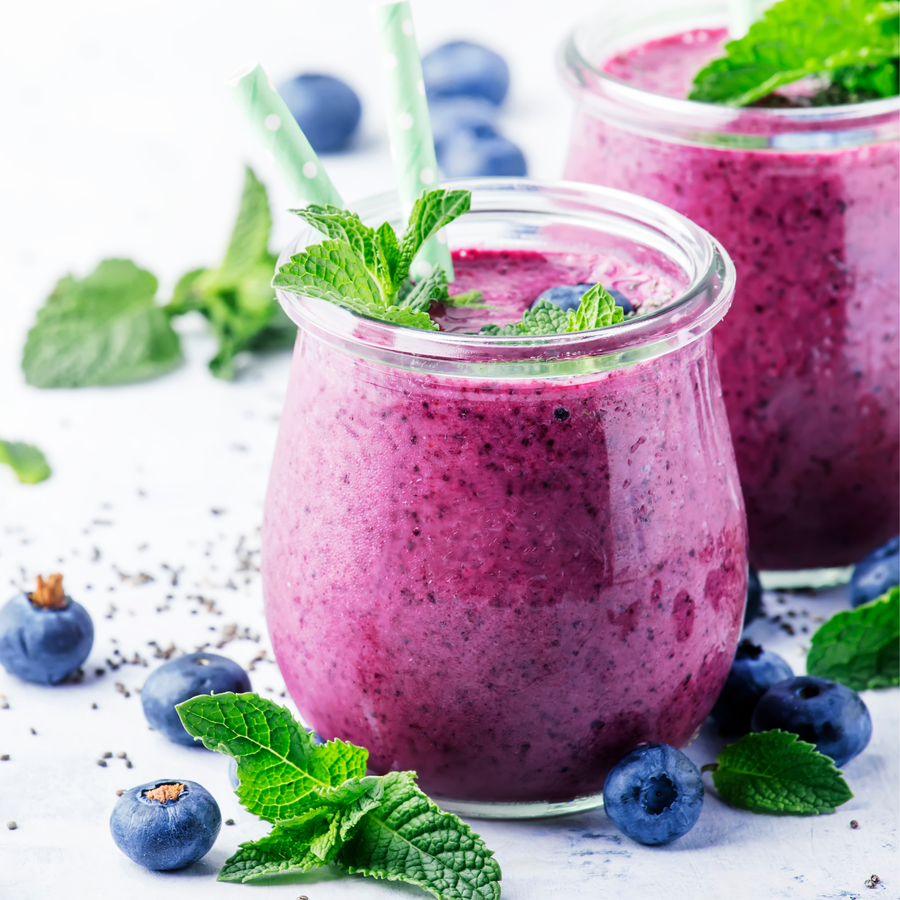We've all be been there. Tossing and turning, staring up at the ceiling, feeling the time go by, knowing your alarm clock could go off any minute. You've tried everything to help you fall sleep -- from counting sheep, to drinking chamomile tea, to diffusing lavender. And the results? A morning filled with loads of coffee, and checking your pulse though out the day wondering if you'll get through the next 5 minutes without collapsing from exhaustion.
Lucky for you, I was the exhausted soul that tried everything for better sleep and failed miserably for years. That said, there are a few things that eventually worked as soon as I was able to find the root cause of my issue. Here are a few little hacks that can help you too.
1. You're staring at a screen too close to bedtime
If you expose your eyes to blue light wavelengths after sunset (phones, TV, laptops, artificial lightbulbs, even the indicator light on most electronics), it can disrupt the melatonin in your brain. Blue light signals to your brain that it's daylight, and causes the pineal gland to stop secreting melatonin. Generally, melatonin is secreted two hours before bedtime, and reaches its peak in the middle of the night. It works together with your natural circadian rhythm or internal clock to help you get a good night's sleep.
Blue light wavelengths are relatively short, and naturally emitted by the sun during daytime. They help your brain stay awake and alert, and help improve performance and mood. But what happens when we're exposed to blue light at night? This essentially tells your body that it's still daytime, and throws off your circadian rhythm creating the perfect storm for insomnia or low quality sleep.
That said, it's best to avoid artificial blue lights around the house after sunset by turning off most of your lights and changing the light bulbs to incandescent lights. These lightbulbs are made by Bed Time Bulb, a company that produces biological bulbs that are meant to work in harmony with your circadian rhythm.
2. Waking up around 2:30 or 3 am and unable to fall back asleep?
If you tend to wake up around the same time every night, it's likely due to the fact that the stored glycogen in your liver is depleted, and your body is switching over to running on adrenaline and cortisol. The organ doing a majority of the work while you're sleeping is the liver. It stores glucose in the form of glycogen to produce the energy your body needs to function throughout the night. When you experience low blood sugar in the middle of the night, this is because you've used most of your stored glycogen.
Low sugar in the brain peaks around 3 am. When the brain runs out of fuel, adrenaline kicks in to break down more of the liver's glycogen into glucose and cortisol raises sugar levels to deal with the stress. Sugar regulation is key to supporting sound sleep.
Adrenaline is a hormone that suppresses appetite. If you're fasting and suffering from insomnia, then this is likely the culprit. One of the things that helps me sleep through the night if my window between dinner and sleep is too long is having a teaspoon of raw honey (especially if it also contains bee pollen, propolis and royal jelly) right before bed. Think of it as a superfood cocktail for bedtime. I recommend trying 1 teaspoon of Beekeeper's Naturals Superfood Raw Honey right before brushing your teeth. This will keep your glycogen storage from becoming depleted, while giving you the important nutrients this combination of bee food has to offer.
3. Your liver is under attack
In Chinese Medicine, sleep disturbances in the middle of the night are usually related to the liver.
Your liver plays a critical role in hormone regulation. Your liver isn’t responsible for secreting or producing your hormones. That job belongs to the numerous endocrine glands located around your body as well as organs such as you ovaries. The liver does deal with these hormones once they have served their purpose.
Once the hormones circulating in your system have accomplished their task, whether it be triggering a stress reaction or getting you ready for ovulation, they report to your liver where they are broken down and deactivated. This prevents a hormonal imbalance from occurring.
We already discussed how adrenaline and cortisol affect the body. As we get deeper into the functions, we see that the liver influences these hormones in a couple of ways. First, if you’re prone to stress or anxiety, it likely means that your blood levels of cortisol are elevated. This increases your liver’s workload as it attempts to deactivate this particular hormone. In cases of chronic stress, your liver may become overwhelmed, meaning that excess cortisol may remain in your system for longer – which can be detrimental to your melatonin levels or your sleep patterns!
Stress can really take a toll on your liver because it also depletes your liver’s stores of glycogen. Eventually, your liver will become fatigued from producing more and more glycogen, which will cause your blood sugar levels to become very high, ultimately upsetting your sleep patterns.
The american diet consists of high amounts of polyunsaturated fats (canola, corn oil, safflower oil, sunflower oil, etc) anything that comes from a seed. These are highly inflammatory and get stored in your adipose tissue, your vessels, your organs, including your liver, which can place you at risk of developing NFLD (non-alcoholic fatty liver disease). This disease has become very common. In fact, you don't need to feel sick to have NFLD; I had NFLD at my body prime, when I was physically at my best. How do you overcome this? It's crucial to learn to manage stress, and to reduce the amount of polyunsaturated fats in your diet. Other foods shown to contribute to NFLD include anything with glyphosates (usually conventional, GMO food), preservatives, and foods high in mercury (tuna).
Milk thistle does a very good job at preventing NAFLD, although in its pure form (seeds or seed powder) it is not very bioavailable. Quicksilver has a nanoemulsified formula that does a good job at making it rapidly absorbable. Milk Thistle has high levels of silymarin which has cell membrane-stabilizing and antioxidant activity. It promotes hepatocyte regeneration (liver cells), reduces the inflammatory reaction, and inhibits the fibrogenesis in the liver (scar tissue).
4. Electromagnetic frequencies are disrupting your circadian rhythm
If WiFi signals can transmit through concrete walls, then chances are that they are also piercing through your fragile tissues, cells, and mitochondria. EMF's are electromagnetic fields that all electronics (including outlets) emit. The earth naturally emits electromagnetic fields, and your cells are constantly trying to connect to its natural frequencies. However, with today's technological advancements we are surrounded in an avalanche of electronics everywhere we go. Today our cars are enabled with WIFI and other non-native EMF's. These EMF's are constantly stimulating our cells, and in some cases causing cancer and array of chronic illnesses whose symptoms commonly manifest as chronic fatigue and sleeplessness.
Pay attention to where you put your head at night. Are there any electronics on the other side of the wall? Is your router at close proximity? Even when electronics are off, they still emit electromagnetic fields. Some of the main culprits are smart TV's, and pretty much any Mac product. You are much better off pulling the plug out from the TV when it's not in use. you can test this with an EMF reader, which reads v/m or volts per meter. For reference, the sun emits 200 volts per meter of electromagnetic fields, while the power main in your house can emit 10,000 volts per meter! Sometimes we have no control over where the EMF's are coming from, especially if you live in an apartment, or if you constantly travel and stay in hotels.
There are a few reputable companies that have done the work of fixing this issue, one of them is Blueshield. They have various size of devices that are portable and can protect you anywhere you go. You simply plug it in and keep it in close proximity to you, and it starts emitting a symphony of frequencies within the human responsive range. The body will then respond to the Blushield products rather than your WiFi, smart meter or mobile phone. This process is referred to as sympathetic resonance. Your body would much rather respond to natural frequencies than non-native man-made EMF's. I like to keep the Blueshield TESLA cube in my bedroom and one in my son's, and anywhere I work -- especially during the day when I'm handling multiple devices at once.
5. You have a mineral imbalance. magnesium might be low.
In order to fall asleep and stay asleep, your body and brain need to relax. On a chemical level, magnesium helps this process by activating the parasympathetic nervous system. The system responsible for helping you stay calm and relaxed. Earlier we mentioned adrenaline and cortisol the stress hormones being factors of insomnia. Magnesium is the conductor to the parasympathetic orchestra that helps your body regulate stress.
Magnesium is like the Morgan Freeman of body chemistry, you will see it come up very often, as it is involved in a lot of regulations. For instance magnesium is in charged in regulating melatonin, which guides sleep-wake-cycles in your body. Magnesium also binds to gamma-aminobutyric acid (GABA) receptors. GABA is the neurotransmitter responsible for quieting down nerve activity. It is the same neurotransmitter used by sleep drugs like Ambien.
Magnesium deficiency is one of the reasons we see a rise in modern diseases. Magnesium's primary role is to activate 3,751 proteins, and thus thousands of enzyme systems (far more than the figure of 300 enzyme pathways)
The best way to ensure that your body is functioning at its best is to re-mineralize, QuintEssential does a very good job at formulating a bioavailable form of electrolytes and trace minerals from ocean water. Its concentration is higher than that of our plasma and can readily move into cells. It can help lift the body up, increasing energy and supporting protein synthesis, adrenal function, cellular division, remineralization, and bone formation. I personally take this before I get on an airplane so I can fully hydrate, and before bedtime on very stressful days so I can get the benefits of the magnesium on my nervous system.
6. Not getting enough sunlight. Enter vitamin D.
Vitamin D is produced by the cholesterol on your skin as a result of sunlight exposure. It stands out from other vitamins because it's considered a hormone. Most people don't get enough sunlight therefore they don't get the necessary Vitamin D they need. Low levels of Vitamin D are related to poor quality sleep.
Vitamin D occurs in very few food sources — making it difficult to meet your needs if you’re not getting regular sunlight. You can get your daily recommended dosage of Vitamin D from drinking 30 cups of orange juice, eating 3.5 pounds of salmon, or getting 15 minutes of unobstructed sunlight. Many people do none of these.
Most of us are low in vitamin D because of the way we live – we cover our bodies, “protecting” every inch of our skin from the sun and stay inside most of the time. And if we do go to the beach we lather our skin with SPF hindering the synthesis of vitamin D from the sun.
Supplementing with vitamin D might not be the best idea, since vitamin D is not actually a vitamin it's a hormone and your body makes it. Making sure your cholesterol is ideal is part of the process of being able to convert sun light to Vitamin D. Recent studies have shown that the gut bacteria influence cholesterol metabolism. Any disruption in the microbiome from an unhealthy diet can hinder the way we synthesize vitamin D. We not only need vitamin D from the sun, but the sun gives you other nutrients, red light wavelengths and other spectrums we need for good sleep.
Sounds complicated but it's all a big janga tower. Vitamin D helps to absorb calcium, Vitamin K works together with Vitamin D and helps to place the calcium in the bone matrix. Too much calcium leads to calcification of the cells, magnesium makes sure there is a balance, since calcium and magnesium also work in synergy. Too much of one depletes the other. Make sure you are eating enough fat soluble vitamins. You can easily find them in great quantities in grass-fed animal products like Ghee, raw milk, raw cheese.
7. Your body temperature during sleep might be too high
Environmental temperature is a universal cue for circadian rhythms (sleep-wake cycles) in all humans. It gets colder as the sun sets and warmer as the sun starts to rise. As temperature rises, it cues your body to wake up. Body temperature regulation is a major factor for life as it influences most biochemical reactions. We are constantly surrounded by well regulated environments that prevent our natural circadian rhythm from properly regulating the sleep-wake times. I admit, my house, my car, and my office are constantly running at a temperature of 72 degrees.
Research shows that temperature regulates the on/off button of the sleep-wake cycles. Cold therapy can influence and improve sleep quality and quantity. Thermoneutrality is the range in which we are `comfortable'. That's when we do not generate extra heat to keep warm or waste metabolic energy on trying to cooling off. Keeping the house at 72 degrees stops the body from self-regulating temperature. Our ancestors naturally went through this self-regulation when sleeping in connection with nature. Not to mention the climate created during sleep under the covers and the heating of the mattress, exceeds thermoneutrality making your body waste energy trying to cool you off.
There are several factors that keep the body out of thermoneutrality that increase the body's waking time. Some of these factors are body size, age, sexual cycle, and disease.
The life changing solution every sleep deprived person (including me) swears by is The ChilliPAD It’s comprised of a hydro-powered mattress pad, thermal regulating cube and infrared remote making it perfect for one or two sleepers! Heat or cool your bed from 55-110°F. Doesn't disappoint!
8. Stress. stress. stress.
This is probably the most important factor. I saved this one for last because it's probably the most common issue that goes unspoken. The many emotions in the back of your head that keep you up at night. How do you get rid of those anxieties? You can't really ration with emotions; it's more difficult that it sounds. There are plenty of tools you can use to help you understand these emotions. No matter what it is, there's always a root cause of stress. Find the root cause: Is it a deadline? A fear that you will disappoint someone?
- Find the root cause and work on healing it.
- Choose a place that grounds you where you feel centered and visit as often as possible.
- Select a group of people that can support you and keep you centered.
- Have some tools (ex. breathwork) to use in the moment of stress.
- See the bigger picture: Do you think something is going to actually hurt you? Or is this a fake survival fear?
And if you want to read about more of the geek side of what really causes stress in your body as a chemical reaction you should definitely read: When Stress Can Actually Be A Good Thing




























